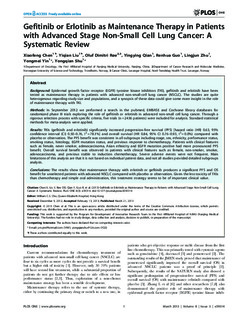| dc.description.abstract | Background:
Epidermal growth factor receptor (EGFR) tyrosine kinase inhibitors (TKI), gefitinib and erlotinib have been tested as maintenance therapy in patients with advanced non-small-cell lung cancer (NSCLC). The studies are quite heterogenous regarding study size and populations, and a synopsis of these data could give some more insight in the role of maintenance therapy with TKI.
Methods:
In September 2012 we performed a search in the pubmed, EMBASE and Cochrane library databases for randomized phase III trials exploring the role of gefitinib or erlotinib in advanced non-small cell lung cancer. Through a rigorous selection process with specific criteria, five trials (n = 2436 patients) were included for analysis. Standard statistical methods for meta-analysis were applied.
Results:
TKIs (gefitinib and erlotinib) significantly increased progression-free survival (PFS) [hazard ratio (HR) 0.63, 95% confidence interval (CI) 0.50–0.76, I2 = 78.1%] and overall survival (HR 0.84, 95% CI 0.76–0.93, I2 = 0.0%) compared with placebo or observation. The PFS benefit was consistent in all subgroups including stage, sex, ethnicity, performance status, smoking status, histology, EGFR mutation status, and previous response to chemotherapy. Patients with clinical features such as female, never smoker, adenocarcinoma, Asian ethnicity and EGFR mutation positive had more pronounced PFS benefit. Overall survival benefit was observed in patients with clinical features such as female, non-smoker, smoker, adenocarcinoma, and previous stable to induction chemotherapy. Severe adverse events were not frequent. Main limitations of this analysis are that it is not based on individual patient data, and not all studies provided detailed subgroups analysis.
Conclusions:
The results show that maintenance therapy with erlotinib or gefitinib produces a significant PFS and OS benefit for unselected patients with advanced NSCLC compared with placebo or observation. Given the less toxicity of TKIs than chemotherapy and simple oral administration, this treatment strategy seems to be of important clinical value. | nb_NO |
